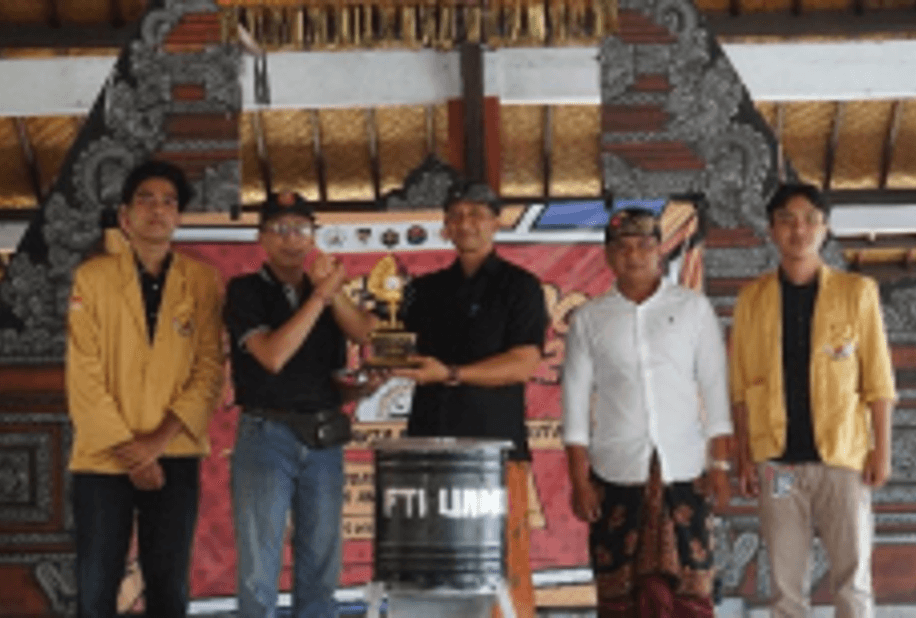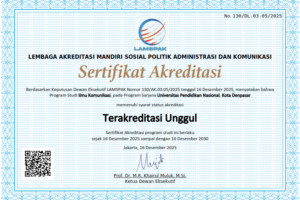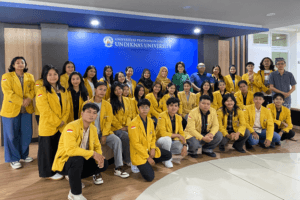
Engineering Social Dedication 2024: A Collaborative Step Towards Sustainable Waste Management
Gianyar, Bali – Waste sorting, often perceived as a simple act, plays a crucial role in achieving sustainable and responsible development goals. By systematically separating organic, inorganic, and hazardous waste, this practice not only reduces the volume of waste sent to landfills but also promotes a more efficient circular economy. It supports sustainable economic growth, minimizes environmental pollution, and fosters behavioral change towards an eco-friendly lifestyle and more sustainable production patterns.
This vision is realized through Engineering Social Dedication 2024, an annual program organized by the Student Executive Board of the Faculty of Engineering and Informatics (BEM-FTI) of Universitas Pendidikan Nasional (Undiknas). In collaboration with the Student Representative Council (BPM-FTI) and various student associations within the faculty, the event was held in Sukawati Village, Gianyar Regency, involving students, local communities, and young generations.
Carrying the theme “Apih Vibhakta Prthivi Paripalita”, which means “A call to take responsibility for the waste we produce,” this program reflects the spirit of the Tri Dharma of Higher Education, particularly in community service. Various activities in this event aim to raise awareness and encourage real action towards sustainable waste management.
The event began with a seminar discussing waste management issues at the local level, featuring two expert speakers:
- I Gusti Ngurah Gede Agung Pradipta, a lecturer at Undiknas, presented “Sustainable Waste Management.” He discussed the types of waste, the negative impacts of poor waste management, and strategies to achieve a circular economy. He emphasized the importance of a systemic and community-based approach to tackling waste problems, especially regarding plastic pollution in Bali.
- I Wayan Subawa, STP, MP, a representative from the Environmental Agency of Gianyar Regency, delivered a presentation on “Waste Management Based on Local Wisdom.” He explained strategies such as the development of waste banks, composting facilities, 3R Waste Processing Sites (reduce, reuse, recycle), and the role of traditional villages (desa adat) in formulating and enforcing regulations related to environmental cleanliness. These solutions aim to cultivate a clean-living culture, improve environmental quality, and generate economic value from waste management.
One of the event’s highlights was the introduction of a waste shredder developed by the design team. Inspired by the mechanism of a blender, this machine can shred waste into small pieces, reducing its volume and facilitating the composting process. This innovation not only optimizes waste storage but also supports organic fertilizer production, aligning with sustainable waste management goals. Participants and lecturers witnessed a presentation on the tool, including its manufacturing process, functions, and benefits.
The final activity, One Action, engaged participants, committee members, and lecturers in a real-world initiative at Sukawati Art Market. Divided into small groups, participants educated vendors and the local community about the importance of waste sorting. Each group was tasked with informing at least five Micro, Small, and Medium Enterprises (MSMEs) within the market area, sharing knowledge on waste categorization and its environmental impact.
This initiative aligns with the Sustainable Development Goals (SDGs), particularly Goal 12: Responsible Consumption and Production, by promoting responsible waste management practices, innovative waste-processing technology, and active community participation. Through the empowerment of local communities and the introduction of innovative solutions, Engineering Social Dedication 2024 demonstrates a commitment to environmental preservation and sustainable progress.
The success of this event underscores the importance of collaboration between universities, local governments, and communities in addressing environmental challenges. Waste sorting is not just a household task but a social movement that drives technological innovation, strengthens community resilience, and ensures a sustainable future for the next generation.
Through programs like Engineering Social Dedication, Undiknas continues to integrate education, community service, and sustainability, realizing its vision of nurturing intellectual pioneers who contribute to a better world.



